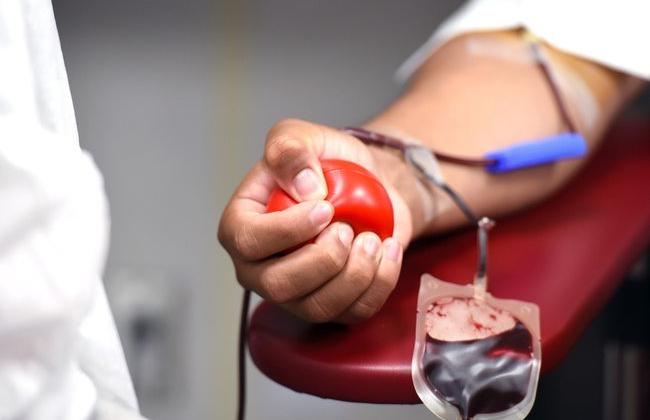German Medical Association Presents Amendment to the Haemotherapy Guideline
Joint press release of the Paul-Ehrlich-Institut and the German Medical Association
The German Medical Association (Bundesärztekammer, BÄK), in agreement with the Paul-Ehrlich-Institut, has amended the "Guideline on the Collection of Blood and Blood Components and the Use of Blood Products". Along with various updates, the new legal framework created by the Independent Patient Advice Service (Unabhängige Patientenberatung, UPD) Reform Act required swift adjustments to ensure the future safety both of those willing to donate and of blood products.
 Source: Michelle Gordon/Pixabay.com
Source: Michelle Gordon/Pixabay.com
In the future, a four-month donation deferral will apply to any person willing to donate who has engaged in sexual behaviour within the previous four months that carries a significantly increased risk of transmission of blood-borne serious infectious diseases. The sexual orientation and gender identity of the person willing to donate or their sexual partners no longer play a role in the risk assessment. Risky sexual behaviour includes
- Sexual intercourse with more than two people in total,
- Sexual intercourse with a new person, if anal intercourse was involved,
- Sex work and receipt of such services,
- Sexual intercourse with a person who is infected with hepatitis B, hepatitis C or HIV or who lives in or has entered an endemic area/high-prevalence country for these viruses.
What is also new is that donation eligibility examinations can be conducted virtually via telemedicine. In addition, regulations regarding donor immunisation for the production of hyperimmune plasma have been incorporated into the guideline. The upper age limits for those willing to donate have been abolished in accordance with the new legal requirements. Before now, the upper age limit for first-time donors was 60 years and for repeat donors 68 years, whereby older individuals could also donate upon consultation with their doctor. Donor eligibility must now be checked every five years for people over the age of 60. The changes were made in agreement with the Paul-Ehrlich-Institut and with the participation of the Federal Ministry of Health and the Robert Koch-Institut.
Dr Klaus Reinhardt, President of the German Medical Association: "The guideline is intended to provide all physicians involved in haemotherapy with a secure foundation for their work. It was and remains clear to the German Medical Association that, for the sake of patient safety, only scientific findings and data may form the basis of medical guidelines. The German Medical Association and its Scientific Advisory Board have once again demonstrated the self-administrative capabilities of the medical profession with the current haemotherapy guideline, which has reached a broad consensus among professionals in accordance with the procedure laid down in the Transfusion Act and in the Statute of the Scientific Advisory Board of the German Medical Association."
Professor Klaus Cichutek, President of the Paul-Ehrlich-Institut: "The Haemotherapy Guideline is developed by the Scientific Advisory Board of the BÄK together with the Paul-Ehrlich-Institut and published in consultation with the Paul-Ehrlich-Institut. The Haemotherapy Guideline defines in detail the legal requirements of European legislation, implemented in Germany via the Transfusion Act. The high safety levels of blood and blood products in Germany are clearly documented in sources such as the Paul-Ehrlich-Institut's haemovigilance reports. The Paul-Ehrlich-Institut supports the innovations introduced with the current amendment, such as the possibilities of telemedicine in the context of blood donation, the abolition of the upper age limits for persons willing to donate in conjunction with regular donor eligibility reviews, and the implementation of legal requirements on the basis of individual risk behaviour for the selection of persons willing to donate. Following the publication of the Haemotherapy Directive in the Federal Gazette, the Paul-Ehrlich-Institut will make the updated selection criteria for persons willing to donate available on its website in an adapted, standardised blood and plasma donor questionnaire. The Paul-Ehrlich-Institut's specifications and step-by-step guidelines for measures such as testing blood donations for infection markers continue to contribute to ensuring a high-quality supply of blood and blood components for transfusion in Germany."
Dr Michael Hallek, Chairman of the BÄK Scientific Advisory Board: "The question of whether a blood donation should be accepted represents a risk stratification on the basis of current medical, scientific, and epidemiological data. This risk stratification had to be modified in accordance with the new version of the Transfusion Act in order to ensure the safety of blood products in the future. Pursuant to the Transfusion Act, BÄK is obligated to follow the current state of medical science and technology. BÄK and its Scientific Advisory Board expressly welcome the fact that, in accordance with legislation, the currently high safety levels of blood products shall continue to be guaranteed."
Dr Johannes Oldenburg, Head of the "Haemotherapy Guideline" Permanent Working Group of the BÄK's Scientific Advisory Board: "In the case of sexual intercourse exclusively between uninfected partners in a long-term relationship, no increased risk for blood-borne infectious diseases can be assumed per se. An increased risk only results from recent sexual contact with persons whose behaviour carries a high risk of blood-borne infectious diseases."
The "Guideline on the Collection of Blood and Blood Components and the Use of Blood Products" will be announced in the German Medical Journal (Deutsches Ärzteblatt) on 4 September 2023 and published on the homepage of the German Medical Association at www.baek.de.
top



